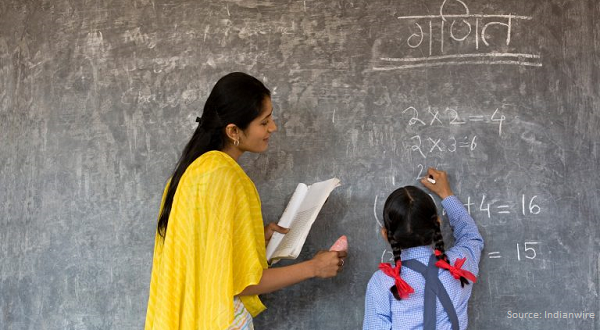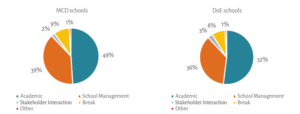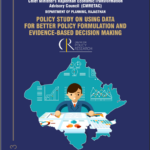
Relooking ‘Non-Teaching’ Roles of Government School Teachers
25 June 2019
“We have to be counsellors, teachers, government servants, surveyors, mothers and clerks, all at once.”
This statement by a primary school teacher in Delhi, encapsulates the various roles teachers fulfill, many of which are far removed from their core role of enabling teaching-learning. The teacher in question described feeling guilty and frustrated about not being able to spend enough time with her students, and instead having to divert more time towards administrative and other non-academic tasks.
This sentiment is a common one and as a result, recent years have seen an increased focus on understanding the non-teaching tasks teachers do and how this impacts the classroom.
Teachers across the country are found to be engaged in a range of non-teaching work such as election duties, vaccination campaigns, cattle census, government surveys, as well as Aadhaar or ration card verification. Last year, a study by the National Institute of Educational Planning and Administration (NIEPA), found that teachers spend only 19% of their time on teaching and teaching-related activities. Meanwhile the rest of their time is spent on non-teaching core activities (over 42%), as well as school management and other education department related work (38%).
The newly released draft National Education Policy (NEP), acknowledges non-teaching work as one of the biggest problems facing teachers and attempts to address the issue, stating:
“…aside from the minimal Supreme Court directives related to election duty and conducting surveys, teachers will not be requested nor allowed to participate in any non-teaching activities during school hours that affect their capacities as teachers.”
The draft goes on to cite some specific examples of non-teaching work teachers will be removed from, including: “Cooking midday meals, participating in vaccination campaigns, procuring school supplies”, which is a start, particularly in light of NIEPA’s findings. However, it fails to go into sufficient detail about the range of non-teaching work teachers are engaged in, vaguely including “any other time-consuming administrative assignments.” The NEP does not specify a benchmark for what is considered ‘time-consuming’ in the average teaching day.
Findings from Delhi
In order to understand how teachers spend their time in school, Accountability Initiative conducted a time use study with 200 teachers from both Municipal Council of Delhi (MCD) and Department of Education (DoE) schools across all 13 education districts of Delhi (the report can be found here). The study included a self-reported time use component which measured the time teachers spent on various activities during a school day, and a perception survey to understand how teachers view their roles and responsibilities, their professional identity and workload, as well as their overall experience of working in Delhi’s government schools. Using purposive sampling, teachers who were identified as the ‘busiest’ by their Head of School and colleagues, were selected. This was done in order to capture just how high teachers’ workload can get.
The perception survey showed that 66% of teachers identified non-academic work as the biggest hurdle they face in school. Majority of teachers identified administrative tasks not directly related to teaching-learning as ‘clerical’ and felt they should not be doing them. For example, 87% and 89% of respondents felt they should not have any role in seeding student Aadhaar cards and the opening or closing of student bank accounts, respectively.
Meanwhile, the time-use data showed that teachers were only able to teach for less than half their time in school. MCD and DoE teachers spent 49% and 52% of time in school, on academic activities (ref. figure below), respectively. However, if other academic tasks like sports, classroom management and teaching-learning supporting activities are excluded, the data shows that teaching alone comprised only 41% of time in MCD schools and 39% of time in DoE schools. School management tasks meanwhile took up 39% and 36% of time in MCD and DoE schools respectively.

Teachers regularly faced disruptions while teaching and this was found to be largely due to routine, essential school management work such as marking and uploading student attendance and mid-day meal (MDM) data. Since MCD schools are only for primary classes, this also included activities like safely handing over students to the parents at the end of the day or staying back after school with students whose parents were late to collect them. In the case of DoE schools, start-of-day classroom management, timetabling and absentee teacher arrangements, as well as checking and responding to mails and circulars, made up the bulk of school management time.
Teachers were also found to be engaged in recordkeeping and data management work, which was often needlessly time consuming due to student data being maintained in multiple formats, as well infrastructure and resource constraints.
Finally, school management tasks often spilled beyond official school hours. Of the 39 hours DoE teachers reported working beyond school timings, 51% time was spent on finishing school management tasks. In the case of MCD schools which reported 49 hours of teachers working beyond school timings, school management work constituted a whopping 94%. Furthermore, instances were found of teachers being sent out of school during school hours, to run errands at the local market, bank and in the case of MCD schools, to the tax office to file income tax returns for all school staff.
The scope of non-teaching work is broad, and there is variation in the types of non-teaching tasks teachers are pulled into, from state to state. In part two of this blog, I look at what the draft NEP proposes to change, and why there is a need for determining exactly what constitute ‘non-teaching’ tasks.
Anupriya Singh is a Research Associate at Accountability Initiative.
_____________________________
References
- Puppala, A. (2018, September 22). Teachers spend only 19.1 per cent time teaching. Deccan Chronicle, Retrieved from http://www.deccanchronicle.com NIEPA





